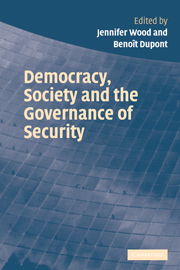Book contents
- Frontmatter
- Contents
- List of contributors
- Foreword
- Acknowledgements
- Introduction: Understanding the governance of security
- 1 Reflections on the refusal to acknowledge private governments
- 2 Transnational security governance
- 3 Two case studies of American anti-terrorism
- 4 Power struggles in the field of security: implications for democratic transformation
- 5 Policing and security as ‘club goods’: the new enclosures?
- 6 The state, the people and democratic policing: the case of South Africa
- 7 Necessary virtues: the legitimate place of the state in the production of security
- 8 From security to health
- 9 Research and innovation in the field of security: a nodal governance view
- Conclusion: The future of democracy
- References
- Index
5 - Policing and security as ‘club goods’: the new enclosures?
Published online by Cambridge University Press: 22 September 2009
- Frontmatter
- Contents
- List of contributors
- Foreword
- Acknowledgements
- Introduction: Understanding the governance of security
- 1 Reflections on the refusal to acknowledge private governments
- 2 Transnational security governance
- 3 Two case studies of American anti-terrorism
- 4 Power struggles in the field of security: implications for democratic transformation
- 5 Policing and security as ‘club goods’: the new enclosures?
- 6 The state, the people and democratic policing: the case of South Africa
- 7 Necessary virtues: the legitimate place of the state in the production of security
- 8 From security to health
- 9 Research and innovation in the field of security: a nodal governance view
- Conclusion: The future of democracy
- References
- Index
Summary
It has become generally accepted that governments alone no longer determine (if they ever fully did) what sort of security is needed by, nor are they the sole providers of policing on behalf of, the populations they govern. Groups other than governments or police, including businesses, landlords, housing providers and citizens, increasingly take control of their own policing needs and select their security providers. As Bayley and Shearing (2001) note, both the authorization and provision of policing are increasingly multi-tiered, fragmented and dispersed. In this context, policing and security have become additional to residual state policing. As individual and collective goods they have become commodified (Spitzer 1987). In a consumerist culture, policing has become encircled in a regime of choice. More so than ever, security is forged through the choices made on the basis of visits to the marketplace. This is not to suggest that policing and security have fundamentally changed nor that they were not previously the subject of a mixed economy (Jones and Newburn 2002c). Social historians forcefully remind us otherwise (McMullen 1996; Beattie 2001). Rather, this is to suggest that recent developments, notably in England and Wales (the focus of my concern in this chapter), but also elsewhere, have brought this mixed economy into sharper relief.
As a result, a second tier of policing and security has mushroomed, sometimes blind to, at other times in conflict or competition with, and at yet other times hand in hand with or steered by, state policing.
- Type
- Chapter
- Information
- Democracy, Society and the Governance of Security , pp. 111 - 138Publisher: Cambridge University PressPrint publication year: 2006
- 38
- Cited by



